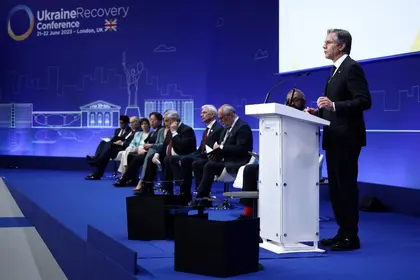The Ukraine Recovery Conference is the hottest ticket in London town on June 21-22, with more than 1,000 delegates gathering to discuss the reconstruction of the country and how it can be funded.
JOIN US ON TELEGRAM
Follow our coverage of the war on the @Kyivpost_official.
This is a matter of central importance to Ukraine, to its neighbors and to the wider continent of Europe. The bill will be absolutely enormous — the World Bank estimates the cost at $411bn for the first year of the war.
In other words, it fails to include not only what has happened in the past four months in Russia’s war of aggression — which includes destruction and downriver devastation from the Kakhovka Dam sabotage — but also the unknowable damage that’s yet to be done.
It’s not unreasonable to think the ultimate cost will rise to $1 trillion, or more.
There are a number of things worth remembering, as with all these great international gatherings.
The first is that the aim of these conferences is to generate real deliverables, not television images. It’s too often the case that when policy-makers face a global issue/problem, the problem is too often answered with a huge conference designed to give the impression of action without the means of delivery.”
This conference states that it aims to focus on the role of the private sector in Ukrainian recovery and reconstruction. And that is truly important. But the private sector cannot have the leading or dominant role. That will only happen three to five years down the line; maybe.

N. Korean Troops Massed in Russia to Enter Ukraine War ’Soon’: Pentagon Chief
There are many reasons for this, but let’s focus on the most important:
- The scale of the challenge is just too big — $500bn-$1 trillion reconstruction costs means that it has to be a joint effort, with the public sector leading the way and the private sector following.
- I don’t think there has been an example of the private sector successfully leading such a challenge, say with reconstruction in Iraq or the former Yugoslavia. Ukraine’s reconstruction is part of the Western security priority. It is a public good that the private sector cannot be expected to see in the same light. This is because:
- War/security risks will remain for some time;
- Ukraine will emerge with an unsustainable debt burden from this war (that is, greater than 100% of GDP), negotiations over debt relief could take some time especially given the backdrop of a pot of $330bn in frozen Russian assets at the end of the rainbow (creditors will ask why they should give debt relief while frozen Russian assets are being ring-fenced?);
and Ukraine won’t have market access early in the reconstruction effort unless the frozen Russian assets are brought into play — which will be a constraint on financing private sector involvement. The cost of capital will remain prohibitively high relative to returns adjusted for security risks.
It is best to just to be honest and open about these problems. In order to do this, I would suggest the focus must be firmly on the two following questions:
- Who will pay for Ukrainian recovery and reconstruction, and how will they fund it?
While it’s nice talking about “build back better”, it would be better to just cut to the chase.
If we don’t wake up and channel Russian assets for the use of Ukraine, Ukrainian reconstruction will not happen. We just need to be honest. Of course, there are costs in doing this — issues around property rights/sovereign immunity — but these costs are far outweighed by the costs if we don’t find the money to fund Ukraine’s reconstruction.
- How will Ukrainian recovery and reconstruction be organized?
Failure to address this would be a very serious matter. The private sector will simply not invest at scale unless there is a credible and organized oversight process.
At present, aid flows, both bilateral and multilateral, are not well coordinated from the Western/G7 side.
We need a new financial Ramstein process (formally the Ukraine Defense Contact Group), as applies to military aid. I would argue that this needs a leadership/governance cadre and an executive.
It needs a high-level Western political/business leader to head the entity and to cheerlead for Ukraine when the war ends. It needs an executive to manage the process — to coordinate inflows, work with Ukraine to identify and manage projects — and then there is the whole championing of reform efforts in Ukraine. I have argued for a sovereign wealth style structure, but it can be anything with a clear Ukraine focus (to underline the importance and Western commitment to the project, long term.) About 16 months have now passed since Russia’s full-scale invasion and there remains too little progress on the right institutional framework.
Only once we have the answers to these two questions can we begin to think through the vision of what sort of Ukraine can be built back —money can’t be spent until it’s known how much is available and under what institutional framework it will be delivered.
I just hope we don’t reach June 23 and discover that the only real beneficiaries are the airlines and hotel chains servicing the delegates.
Reprinted from cepa.org. See the original here.
The views expressed are the author’s and not necessarily of Kyiv Post.
You can also highlight the text and press Ctrl + Enter






